
LIMNOLOGY AND OCEANOGRAPHY-METHODS
metrics 2024
Pioneering methods for a sustainable aquatic future.
Introduction
LIMNOLOGY AND OCEANOGRAPHY-METHODS is a premier journal published by WILEY, dedicated to advancing the understanding of methodologies in limnology and oceanography. With an ISSN of 1541-5856, this esteemed publication has established itself within the academic community, holding a solid Impact Factor and proudly ranking in the Q1 category for Ocean Engineering according to 2023 metrics. The journal, which has been converged since 2003, encompasses a broad scope that includes innovative techniques and applications essential for aquatic research and environmental monitoring. As a leader in the field, it is ranked #32 out of 105 journals in Ocean Engineering, placing it within the 70th percentile of its category. While it operates under subscription access, LIMNOLOGY AND OCEANOGRAPHY-METHODS serves as an invaluable resource for researchers, professionals, and students alike, providing critical insights that drive advancements in aquatic sciences.
Metrics 2024
 0.86
0.86 2.10
2.10 2.80
2.80 86
86Metrics History
Rank 2024
Scopus
IF (Web Of Science)
JCI (Web Of Science)
Quartile History
Similar Journals

GULF AND CARIBBEAN RESEARCH
Connecting Research to Ecological ChallengesGulf and Caribbean Research is an esteemed academic journal published by the University of Southern Mississippi, dedicated to advancing the understanding of aquatic ecosystems in the Gulf of Mexico and the Caribbean region. With an ISSN of 1528-0470 and an E-ISSN of 2572-1410, the journal serves as an essential platform for researchers and professionals in the fields of Aquatic Science, Oceanography, and Water Science and Technology, recognized in the 2023 Q3 Quartile rankings across these disciplines. The journal welcomes diverse contributions including original research, reviews, and technical notes, encouraging interdisciplinary approaches to address ecological and environmental challenges within its scope. Despite the absence of an open access option, it provides invaluable insights, evidenced by its Scopus rankings, which position it within the 31st to 33rd percentile across various related categories. The engaging research articulated in Gulf and Caribbean Research fosters dialogue and collaboration, making it a vital resource for those committed to scientific discovery and conservation efforts in these critical aquatic environments.
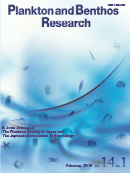
Plankton & Benthos Research
Connecting Research and Innovation in OceanographyPlankton & Benthos Research, published by the Plankton Society of Japan, serves as a pivotal platform in the fields of Aquatic Science, Ecology, and Oceanography. With its inception in 2006 and ongoing publication until 2024, this esteemed journal focuses on the complex interactions within aquatic ecosystems, emphasizing the significance of plankton and benthic organisms in maintaining ecological balance. Although it is categorized in the Q3 quartile across several disciplines, it continues to provide valuable insights and a forum for researchers to share innovative findings and methodologies. The journal is not currently open access, which ensures a layer of curator-driven content quality. Its impact, measured through Scopus rankings, showcases its role in fostering knowledge exchange among academics and professionals engaged in ecological and environmental studies. With an ISSN of 1880-8247 and E-ISSN 1882-627X, Plankton & Benthos Research invites contributions that enhance our understanding of the aquatic realm, establishing itself as a crucial resource for ongoing research and advancement in these essential fields.
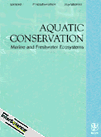
AQUATIC CONSERVATION-MARINE AND FRESHWATER ECOSYSTEMS
Connecting science and policy for aquatic conservation.AQUATIC CONSERVATION-MARINE AND FRESHWATER ECOSYSTEMS, published by WILEY, is a premier international journal dedicated to advancing the understanding of aquatic ecosystems and their conservation. With an impact factor reflecting its significant influence and a distinguished position in the Q1 quartile across key categories such as Aquatic Science, Ecology, and Nature and Landscape Conservation, this journal serves as an essential resource for researchers and professionals engaged in the study and protection of marine and freshwater environments. Covering a broad array of topics, from ecosystem management to conservation strategies, the journal encourages the dissemination of innovative research and interdisciplinary perspectives. Although it is not an open-access publication, this journal is esteemed for its rigorous peer-review process, facilitating a platform where vital research influences policy and practice in the aquatic sciences. Established in 1991, AQUATIC CONSERVATION continues to be a cornerstone in the academic exploration and safeguarding of aquatic ecosystems through to its converged years of 2024 and beyond, providing a critical lens for the future of environmental sustainability.
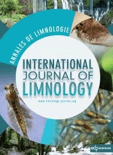
ANNALES DE LIMNOLOGIE-INTERNATIONAL JOURNAL OF LIMNOLOGY
Bridging Theory and Practice in Freshwater ScienceANNALES DE LIMNOLOGIE-INTERNATIONAL JOURNAL OF LIMNOLOGY is a distinguished scientific journal dedicated to the field of limnology, focusing on freshwater ecosystems and their ecological dynamics. Published by EDP SCIENCES S A, this journal has been a vital resource for researchers and professionals since 1965, fostering a deep understanding of aquatic environments through quality research and scholarly discussions. The journal was indexed in Scopus, where it ranked in the 37th percentile within the Agricultural and Biological Sciences category, emphasizing its contribution to aquatic science. While its coverage has been discontinued in Scopus since 2021, the journal continues to engage its readership with critical insights and reviews in limnology. ANNALES DE LIMNOLOGIE promotes open access to facilitate the dissemination of valuable knowledge, making it an essential platform for students, researchers, and professionals who strive to advance our understanding of freshwater systems.

Journal of Oceanology and Limnology
Advancing Knowledge in Ocean and Water SciencesJournal of Oceanology and Limnology, published by SCIENCE PRESS, is a premier academic journal dedicated to advancing the fields of oceanography and limnology. With an ISSN of 2096-5508 and E-ISSN 2523-3521, this journal has emerged as a vital resource since its inception, aiming to disseminate cutting-edge research and comprehensive studies on aquatic environments. Based in China and indexed with notable rankings in Scopus, including a Q2 category in Oceanography and a Q3 category in Water Science and Technology, this journal significantly contributes to knowledge in these crucial scientific disciplines. The H-index for the journal is currently being established, reflecting its evolving impact within the academic community. Moreover, the open access model promotes wider dissemination, ensuring that research findings are accessible to a global audience. Covering a diverse range of topics from ecosystem health to climate impact on water bodies, the Journal of Oceanology and Limnology aspires to foster interdisciplinary dialogue and innovation among researchers, professionals, and students engaged in understanding and preserving aquatic life.

MARINE AND FRESHWATER RESEARCH
Diving into the dynamics of ecosystems.Marine and Freshwater Research is a prestigious journal published by CSIRO PUBLISHING that serves as a key platform for the dissemination of cutting-edge research in the fields of Aquatic Science, Ecology, and Oceanography. With an impactful presence since its inception in 1948, the journal provides critical insights into the dynamics of freshwater and marine ecosystems, promoting interdisciplinary approaches that contribute to our understanding of biodiversity and sustainability. Currently ranked in the Q2 category across major scientific domains, including Ecology and Aquatic Science, it enjoys a robust academic reputation supported by impressive Scopus rankings, such as Rank #66/247 in Aquatic Science and Rank #44/145 in Oceanography, reflecting its high citation impact and relevance. While offering a subscription-based access model, the journal remains dedicated to fostering dialogue and innovation within the scientific community, aiming to bridge the gap between research findings and practical applications in environmental management. Located in Australia, Marine and Freshwater Research is an essential resource for researchers, professionals, and students dedicated to exploring the complexities of aquatic ecosystems and advocating for their preservation.
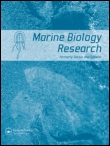
Marine Biology Research
Fostering collaboration in marine biology.Marine Biology Research is a premier journal published by Taylor & Francis, focusing on the dynamic field of marine biology and its intersecting realms of aquatic science, ecology, and oceanography. Since its inception in 2005, this journal has served as a crucial platform for researchers and professionals to disseminate their findings, with a vision extending to 2024 and beyond. The journal is recognized with a Q3 quartile ranking in both Aquatic Science and Ecology, Evolution, Behavior and Systematics, underscoring its growing influence in these fields as evidenced by its Scopus rankings. Located in the United Kingdom, Marine Biology Research aims to foster collaboration and innovation through open access options, facilitating knowledge exchange among the academic community. With a steady commitment to advancing marine sciences, this journal is an invaluable resource for those dedicated to understanding and preserving our ocean ecosystems.

BULLETIN OF MARINE SCIENCE
Pioneering insights in marine and atmospheric studies.BULLETIN OF MARINE SCIENCE, published by Rosenstiel School of Marine and Atmospheric Science, is a prominent journal dedicated to advancing the field of marine science through scholarly research and peer-reviewed articles. With an ISSN of 0007-4977 and an E-ISSN of 1553-6955, this journal has been contributing to significant scientific discourse since its inception in 1973. Covering a wide spectrum of topics in aquatic sciences and oceanography, it has maintained a respectable position in the academic community, as evidenced by its Q3 ranking in both categories for 2023. Although currently not an open-access journal, it provides essential access to groundbreaking research that informs marine conservation, ecological studies, and atmospheric sciences. Situated in the United States at 4600 Rickenbacker Causeway, Miami, FL 33149, the journal serves as a vital resource for researchers, professionals, and students seeking to engage with the latest findings in marine science and foster a deeper understanding of our oceans.
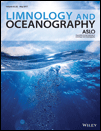
LIMNOLOGY AND OCEANOGRAPHY
Connecting Science with Conservation EffortsLimnology and Oceanography is a premier peer-reviewed journal published by Wiley that has been at the forefront of aquatic sciences since its inception in 1956. With an impressive impact factor placing it in Q1 in both Aquatic Science and Oceanography categories, this journal showcases cutting-edge research and studies relevant to the dynamics of freshwater and marine ecosystems. Limnology and Oceanography serves as a vital platform for researchers, professionals, and students to disseminate their findings and foster a deeper understanding of aquatic environments. The journal does not currently offer open access, but it provides a unique opportunity for scholars to contribute to a body of work that influences policy, conservation efforts, and the scientific community at large. With its substantial ranking in Scopus as #12 in Aquatic Science and #9 in Oceanography, Limnology and Oceanography remains a critical resource for advancing knowledge in these vital fields.

Inland Waters
Fostering Collaboration for Healthy Inland WatersInland Waters, published by TAYLOR & FRANCIS LTD, stands as a prestigious scholarly journal dedicated to the critical examination of freshwater ecosystems and their management. With an ISSN of 2044-2041 and an E-ISSN of 2044-205X, this journal boasts a remarkable Q1 ranking in both Aquatic Science and Water Science and Technology for 2023, reflecting its significant impact in the field. Researchers and professionals can benefit from its comprehensive coverage of cutting-edge research, methodological advancements, and policy implications concerning inland waters. Committed to disseminating valuable knowledge in a vital area of environmental science, Inland Waters aims to foster collaboration and promote innovative solutions for sustainable water management practices. As it continues through its converged years from 2012 to 2024, the journal remains an essential resource for those dedicated to advancing our understanding and stewardship of freshwater environments worldwide.